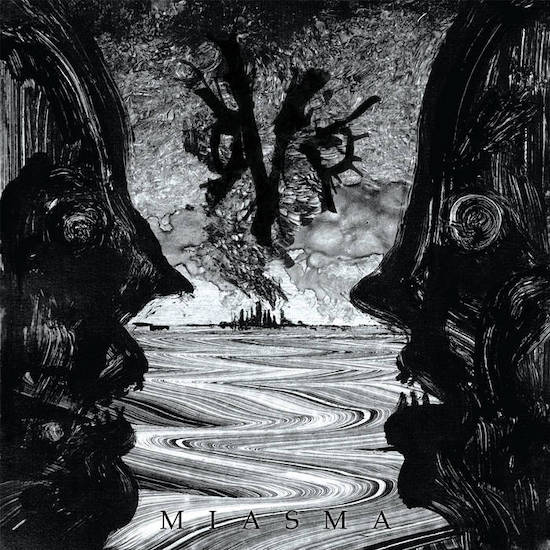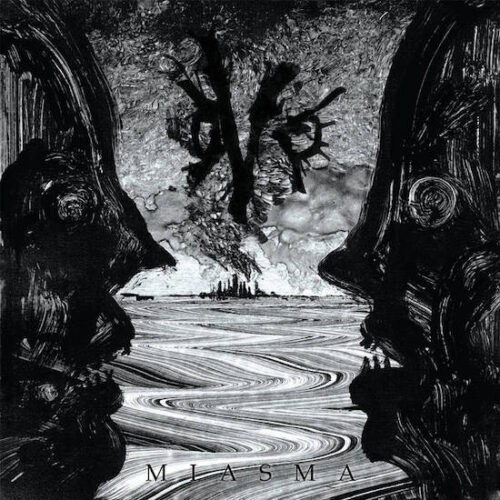Italian experimental rock duo OvO, which formed in 2000, has evolved slowly. Over the course of nine albums, OvO’s sound has mutated from an Early-Swans indebted noisy and chaotic dirge of feedback drenched crunchy riffs and tribal minimal rhythmic patterns into a more precise, mechanical, and strategically punishing beast.
Considering the group – comprised of guitarist and vocalist Stefania Pedretti and drummer Bruno Dorella – emerged out of a loose improvisational concept group and only became a regular touring band to play alongside the Minneapolis dada noise troupe Cock ESP, it’s astonishing just how much time they have spent honing their sound and aesthetic. On early albums like Creatura, the duo tended to limit their sound to easily identifiable touchstones – sludge metal bands like Eyehategod and Amphetamine Reptile stalwarts like Karp, for example – and were easier to recognize by their unmistakable visual presentation: satanic symbols painted on their faces, the tattered clothes of pagan druids, dreadlocks, campy horror vibes. They looked like a couple of goth visigoths; a gimmick equally disarming and alarming.
But their sound has progressively taken on elements of noise, industrial, EBM, sludge, doom and other bummer styles of heavy and strange rock music. On the group’s new release Miasma, however, the group has narrowed on a tight sound that simultaneously veers between two well-worn styles of underground music. At times the record’s sound is mesmerising. At others, it feels like it’s lacking something. But there is an undeniably intriguing approach here.
Miasma is the band’s first release on the Toronto-based label Artoffact, which was chosen by the band due to the label’s equal affinity for heavy music and synth punk, according to Dorella. And indeed, when the album burns brightest, it seems to veer between a sickeningly lo-fi synthetic punk – the utterly disorienting and schizoid nature of the electronics on display reminds me of the 1980s Bay Area synth punk provocateurs German Shepherds – and a dense, hypnotic and contrastingly well-produced thunderous sludge. Comparisons to The Body would be fair (more on that later), but it might be more apt to think of Thrones gone unapologetically, theatrically cyber goth.
During the album’s best moments, the shifts in tones can be exhilaratingly maniacal, like topping off heroin with a line of methamphetamine, or sneak inserting a piece of Dennis Cooper text into a Nicholas Sparks novel. It’s really all over the place, thrillingly so at times, and less successfully so at others. The opening track, ‘Mary Die,’ begins with a tight snare kick before the double bass hits and feedback collides with Pedretti’s blood curdling, blackened snarl. A versatile vocalist of the macabre, Pedretti raises a listener’s hair when wailing “MARY…… DIEEEEEEE!” The song is equally interesting when it slows down, allowing the listener to decompress after all that synthetic power violence despair mongering.
Overall, it’s the album’s upbeat, EBM-indebted stompers that remain the more impressive pieces of sound on the album, broadening the range of the kind of music we’ve come to associate with OvO and incorporating a scuzzy and nihilistic (dare I say it) disco-esque thump. ‘Queer Fight,’ for instance, almost reminds me of the kinds of death disco punk bands that were playing at Los Angeles venue The Smell around the mid-’00s: Erase Errata, Abe Vigoda, and the like, but distorted by pummeling bass, feedback noise, and gargling cookie monster vocals.
There’s a refreshingly off-kilter quality to the record, like OvO is exploiting and celebrating its penchant for goth camp theatrics and manifesting a more pronounced sense of humour in the work. Susan Sontag of course defined camp aesthetics as defined by “love of the unnatural: of artifice and exaggeration.” OvO seems to take low culture dead seriously and at its best brings a delightfully camp sensibility to extreme and experimental music, a style of art not always known for its good humour (to say the least). ‘L’Eremita,’ a track featuring Årabrot’s Kjetil Nernes on spoken word and vocals, is a winning mid-album track in which OvO sounds like a groovy deathrock band playing in an uncanny, Lynchian lounge bar. All atmosphere and nonchalant angst.
That said, there are moments on the album when the band fails to live up to the joyfully upbeat and theatrical moments it achieves on its best tracks. The choice to feature Swedish rapper Gnučči on ‘Testing my Poise’ confounds. Considering the song boasts what could be considered a prototypically OvO sound, thunderous feedback and dense, chugging rhythm, the incorporation of spastic rap vocals exudes gimmickry. And while there’s cases like this in which the band leans too heavily into silliness, there are also moments on the album when they move too far away from that humor.
The title track that closes the album is heavy on ambient soundscapes and slow, down-tuned riffs that fade in and out, and the only melodically sung vocals on the album. Though it is perhaps a bit unfair to compare the band to Portland’s geniuses of avant-metal The Body considering OvO has been playing this style of music as a duo for even longer than them, I also can’t shake the feeling that The Body has perfected this style of high drama, deeply compositional atmospheric noise metallic sound, and used it as a space for exploration and collaboration with a cohort of similarly minded musicians. The shadow of The Body looms heavily over tracks like ‘Miasma.’ That said, the shrieking wails of feedback and screams that close out the track are impressive.
But OvO has crafted an undeniably interesting and fresh take on their sound on Miasma. It’s an incredibly difficult tight rope to walk, veering between dead serious experimental and heavy sound and synthetically camp theatrics. But at the album’s best moments, it strikes that balance beautifully. Today’s best filmmakers of dark horror cinema – your Ari Asters, your Robert Eggers, your Julia Ducournaus – have all been able to suffuse an intellectual sincerity and genuine sense of the eerie and nightmarish with flourishes of theatrical humor and over-the-top camp sensibility. OvO’s greatest accomplishment here is bringing a similar sensibility to the often dead serious world of extreme experimental music. This is dark and extreme music meant to be enjoyed.



